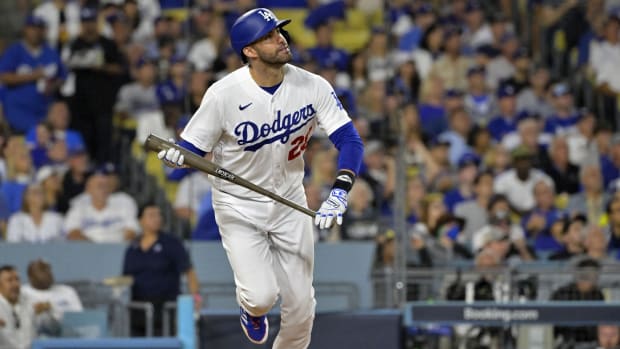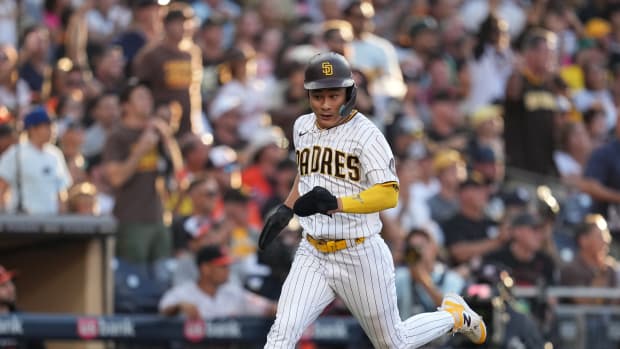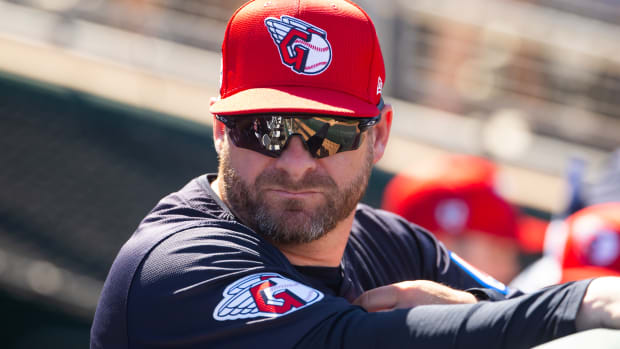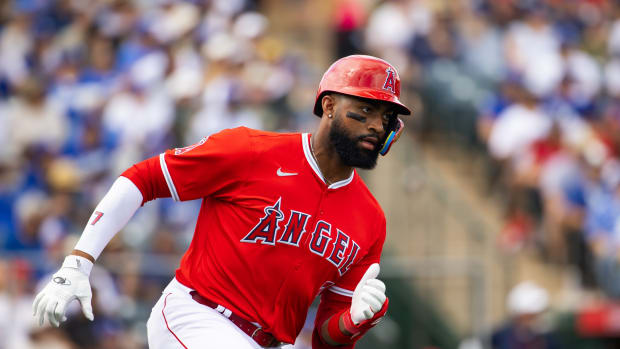How Worried Should We Be About These Four Contenders?
It’s panic time! Or at least it's time to wonder about these four contenders, all of whom are off to poor starts in 2019. But just how much hair-tearing and lamentation should fans be doing after a rough first week for their squads? Let’s dive into the early numbers to see what’s wrong with each, and whether you should expect better or worse going forward.
Boston Red Sox (2–8)
Boston’s problems begin in the rotation, which has been, as the French say, absolute trash. Through eight starts, Boston’s top five—Chris Sale, David Price, Nathan Eovaldi, Rick Porcello and Eduardo Rodriguez—have been blown up, allowing 42 runs (36 earned) in 35 2/3 innings, for a 9.08 ERA.
In breaking down Sale’s disaster of an Opening Day, I noted his velocity, which was decidedly below his previous averages. The same was true in his second start against Oakland, where his fastball sat at a Chris Young-esque 89.9 mph. Of the 50 four-seamers he’s thrown this season, meanwhile, he’s gotten exactly zero swings and misses, and batters are hitting a ridiculous .625 against it. That won’t play, and regardless of whether his issue right now is mechanics, injury or a voodoo curse, the Red Sox don’t really stand much of a chance with a compromised Chris Sale.
But should Sox fans be panicking? The rotation should get better. (At the very least, it can’t get worse.) And while the only players hitting right now are J.D. Martinez and Xander Bogaerts, there’s not much reason to expect Mookie Betts (.235, one homer) and Andrew Benintendi (.207, 0 homers) to keep slumping. One concern there, though, is that, beyond that core four, Boston is thin. Important contributors Rafael Devers (233/.303/.300) and Jackie Bradley Jr. (194/.194/.226) have both been disappointing early on.
Boston needs to get going, and soon, because this skid has already done damage. Per FanGraphs, the team’s projected win total has slid from a preseason 96 all the way down to 91; concordantly, its playoff odds have dropped from 90.3% to 72.6. It may be early, but these games count all the same, and in a hyper-tight division like the AL East, extended slip-ups can be fatal.
Chicago Cubs (2–6)
Trying to find a positive on the Cubs right now is about as easy as holding leads is for their bullpen. I’ll give it a shot, though. Well, for starters, Willson Contreras, Anthony Rizzo and Kyle Schwarber are all hitting well after down 2018 seasons. The bench has been productive when called upon. So there you go. It’s not all bad on the North Side.
In reality this is as brutal a start as Chicago could’ve imagined. The pitching has been stomped on, giving up 46 runs in six games. The defense has made nine errors already. And the bullpen … the less said about that, the better. Cubs relievers have combined for an 8.86 ERA in 21 1/3 innings, including 19 walks and three blown saves.
It’s abundantly clear that the relief corps needs help, as it’s not deep and runs out of reliable arms quickly. That was the case before the season, too, but Chicago’s ownership decided the best course of action was doing nothing instead of using its limitless financial resources to fix the problem. Signing the still-available Craig Kimbrel would be a start, as would getting back the injured Brandon Morrow, but the Cubs need more than those two right now.
Right now, the lineup is doing all the work in Chicago, but that won’t be enough. The bullpen can’t be this bad forever, and Yu Darvish could rebound (as well as Cole Hamels and Kyle Hendricks, both of whom were hit hard in their first starts). But that’s a shaky proposition. The Cubs don’t need to panic just yet, but they do need to figure out how to supplement a ragged pitching staff, and soon.
Houston Astros (4–5)
It’s been a while since Houston’s toted around a losing record of this margin. The 2018 team never dipped below .500, nor did the ’17 World Series champs. You have to go all the way back to June 18, 2016 to find the last time the Astros were three games or more under that mark; they’ve been winners ever since.
You shouldn’t expect this rough stretch to be the new normal, though. Houston hasn’t hit, scoring just 15 runs in seven games, but some of that can be blamed on an early encounter with the Rays’ surprisingly strong pitching staff. So, too, can some fault fall on early slumps for Alex Bregman (5-for-24) and Jose Altuve (6-for-27) atop the lineup. But the rotation, save one bad start for Justin Verlander, has held its own, and the bullpen has been phenomenal, allowing just four runs in 17 1/3 frames.
If anything, the Astros should feel good about some of their early returns. Carlos Correa looks like himself again after a lost 2018. Collin McHugh and Brad Peacock have shone in their returns to the rotation. Hard-throwing righty Josh James has emerged as a potent multi-inning weapon in the bullpen. There are some concerns—namely a weak bottom half of the order—but there’s already plenty to like about Houston. This slump should be short.
Los Angeles Angels (3–6)
Let’s get this out of the way: This isn’t Mike Trout’s fault. Per usual, the best player in baseball is doing everything he can to keep his team afloat, hitting .350/.517/.600 through the Angels' first seven games. And also per usual, the rest of the Angels are lead weights around his ankles. Justin Bour (two hits in 22 at-bats), Tommy La Stella (3 for 18), Zack Cozart (1 for 23) … those aren’t exactly the names you pencil in to a championship-caliber starting nine. They’re reserves or second division starters. This simply isn’t a good offense.
Nor do the Angels have the pitching to carry such a light-hitting group after an offseason spent shopping in the bargain bin. Matt Harvey has given up 10 runs, five walks and three homers in 10 innings. Chris Stratton and Felix Peña have allowed eight runs in eight innings. With Andrew Heaney currently sidelined with elbow trouble, your resident ace is either Trevor Cahill or Tyler Skaggs, and that’s not how one builds a World Series contender.
As has seemingly always been the case with the Trout-era Angels, the front office did just enough this winter to keep this team floating near .500 without doing more to put the roster over the top. You’re already seeing that play out so far, with an overmatched group of has-beens and never-weres getting easily swept aside. Angels fans should have been panicking about this season long before it started.



































